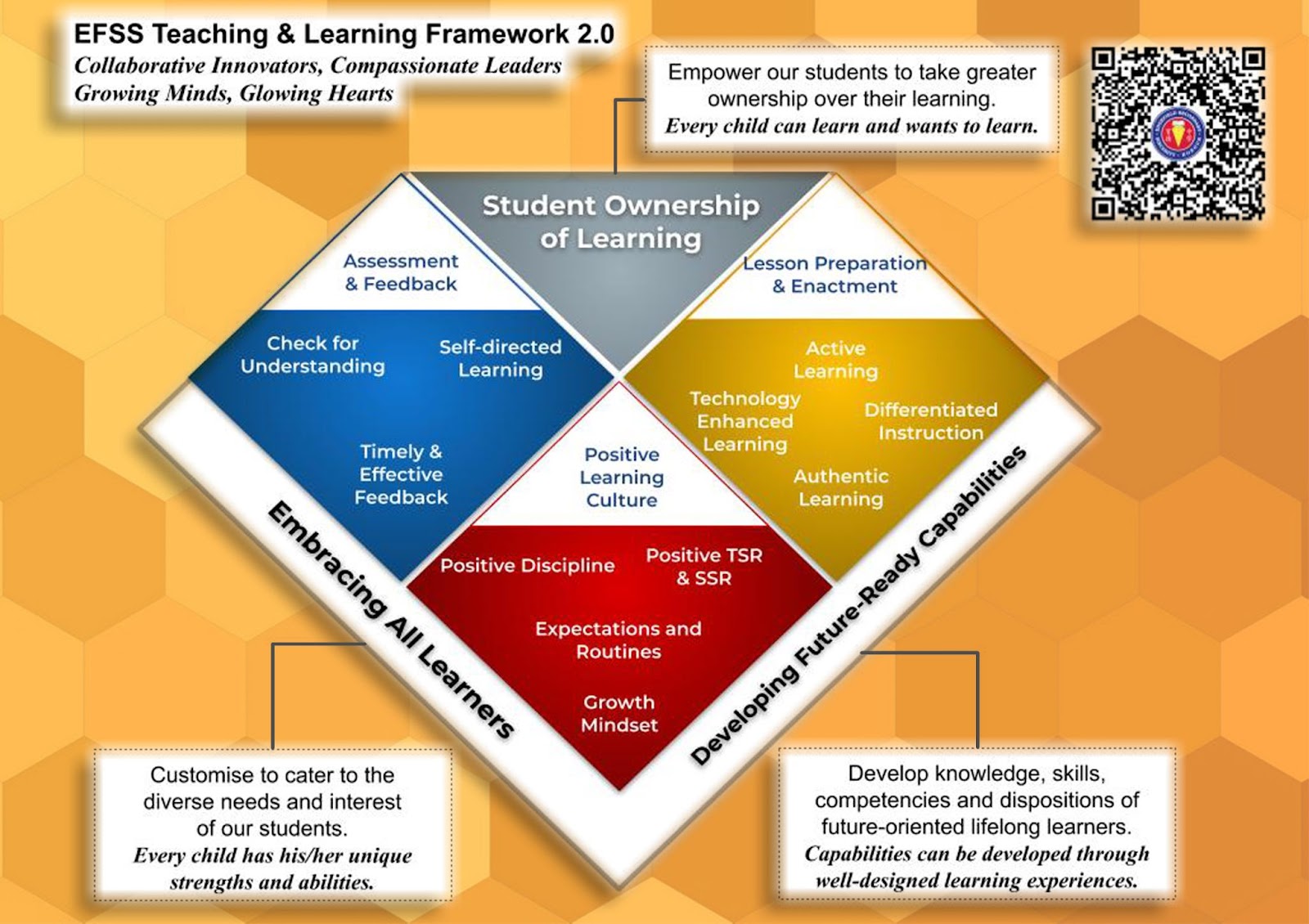Autonomy Supportive Behaviours
T&L Framework

The school’s T&L framework is designed to guide us in the delivery of high quality teaching and learning practices in the school. In the spirit of continual learning, the T&L framework is a ‘live’ document which is refined as we read, tap on expert knowledge and adopt evidence-based approaches and practices.
Surrounding the diamond in our Edgefield Teaching & Learning (‘T&L’) Framework are two strategic objectives, “Embracing All Learners” and “Developing Future-Ready Capabilities”. They undergird the key focus areas of T&L practices grouped within three smaller diamonds that represent the teaching processes in the Singapore Teaching Practice, namely
“Positive Learning Culture”, “Lesson Preparation and Enactment” and “Assessment &
Feedback”. The crown of the diamond framework captures the core objective - to foster greater student ownership of learning.
At Edgefield, we seek to empower our students and encourage them to take greater ownership of their learning by employing autonomy-supportive teaching practices to increase their motivation and engagement in learning. In assessment and feedback, we seek to provide opportunities for students to be involved in the assessment and feedback process and monitor their own progress through learner-centered assessment design and feedback pedagogy.
To equip teachers with the competencies to develop autonomous learners through autonomy-supportive practices and feedback pedagogy, the school’s management team developed their understanding of building autonomous learners by reading educational literature and engaged teachers in school-level professional development sessions to learn autonomy-supportive teaching strategies which empower students and develop learner autonomy. The literature shows that (1) teachers can learn how to become more autonomy supportive during instruction (autonomy-supportive teaching is malleable) and once learned, (2) this greater autonomy-supportive teaching produces a wide range of educationally important student, teacher, and classroom climate benefits (Johnmarshall Reeve & Sung Hyeon Cheon (2021) Autonomy-supportive teaching: Its malleability, benefits, and potential to improve educational practice, Educational Psychologist, 56:1, 54-77)
Edgefield is guided by the Academy of Singapore Teachers’ philosophy of ‘Teacher Ownership and Teacher Leadership’ where we believe that empowering teachers to take greater ownership of their learning will improve the professional development outcomes. Teachers are strongly encouraged to be self-directed and collaborative learners and are provided the time and space to learn, create and collaborate with colleagues, modelling the attitudes and behaviours of ‘autonomous learners’.
Sharing in SingTeach
In the September 2022 issue of SingTeach, an article on using Reciprocal Teaching to enhance autonomy supportive behaviours was presented based on the research presentation done by Dr. Ravinder Mohan Sharma, Lead Teacher (High Ability Learners) at the Redesigning Pedagogy International Conference 2022.
Autonomy-supportive teaching involves behaviours that seek to promote students’ tendency to engage in learning because they value this activity or find it interesting (Roth, Assor, Kanat-Maymon, & Kaplan, 2007). Indeed, autonomy-supportive behaviours facilitate more self-determined forms of motivation. In the context of an English Language classroom, would reciprocal teaching be able to enhance autonomy-supportive behaviours?
Reciprocal teaching is an instructional activity in which students become the teacher in small group reading sessions. The purpose of reciprocal teaching is to facilitate a group effort between the teacher and students as well as among students in the task of bringing meaning to the text (Palincsar, 1986). The teacher models, then helps students to learn to guide group discussions using four strategies: summarising, generating questions, clarifying and predicting in reading comprehension.
Through a five-week study involving two English Language classes of 15-16 year-old mixed-ability students, it was found that while students were gradually internalising the strategies used by excellent readers, it was noted that through teacher reflections and student feedback, certain autonomy-supportive behaviours were realized and enhanced. For example, the teacher and students found that such an activity grew the students’ psychological needs for autonomy, competence and curiosity. The teacher also reflected that students needed to work at their own pace and he postponed his help and assistance until it was needed. Indeed, the enhancement of these behaviours in the pre-lesson stage, start of lesson, and the duration of the lesson, are explained in this study.
The whole article can be accessed through this link in SingTeach online: https://singteach.nie.edu.sg/2022/07/27/st81-reciprocal-teaching-and-autonomy-supportive-behaviours-to-nurture-independent-learners/

